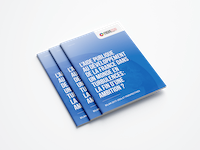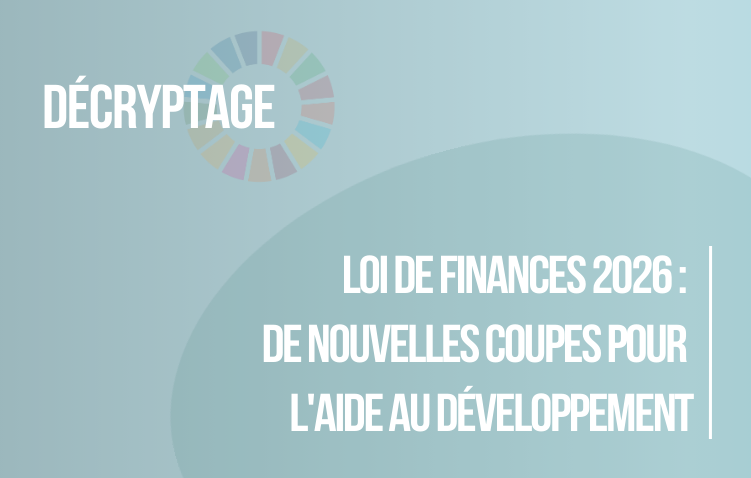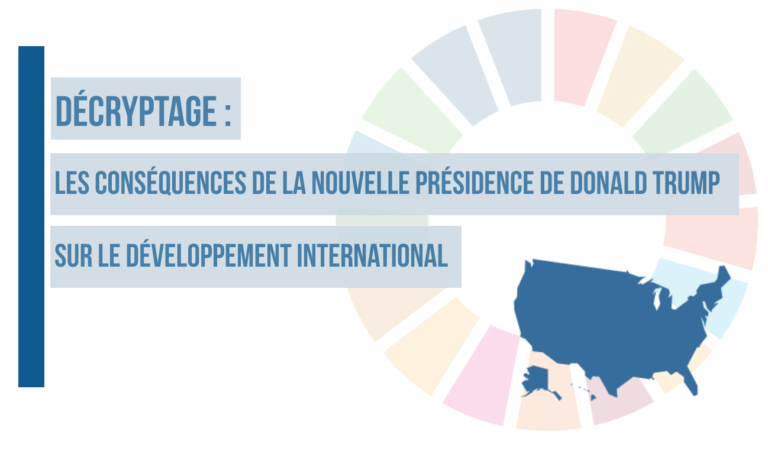France reneges on its Official Development Assistance commitments
Publié le 30/04/2025.
 |

A longstanding player in Official Development Assistance (ODA) and international solidarity, France has, since 2023, undertaken an unprecedented rollback of its commitments. Following a five-year postponement of its objective to allocate 0.7% of national income to international solidarity, France has carried out three successive cuts to its ODA budget. The budget line for ODA, which accounts for around 45% of total French ODA, was reduced by 39% between 2024 and 2025—a historic cut amounting to nearly 2.3 billion euros. Moreover, the government plans to reduce it by an additional 700 million euros in the 2026 Finance Bill. Analysis and reactions from civil society actors.
History of France’s budget cuts in its Official Development Assistance (ODA):
|
A 50-year-old unfulfilled promise postponed for another five years
France is currently the world’s fourth-largest donor of Official Development Assistance (ODA). In 2024, it allocated 0.48% of its gross national income (GNI), or 14,3 billion euros, to this public policy. However, it has never met the international commitment, adopted by industrialized countries at the United Nations in 1970, to devote 0.7% of their revenues to ODA.
In 2021, a new law enshrined a historic step forward, stipulating that 0.7% of GNI be devoted to ODA by 2025. However, the government discreetly backtracked on this commitment in the summer of 2023, pushing back the target to 2030, on the occasion of the Interministerial Committee for International Cooperation and Development (CICID).
According to Focus 2030 projections, the postponement of this target from 2025 to 2030 as well as budget cuts for ODA in 2024 and 2025 cuts represent a shortfall of more than 35 billion euros for international development between 2025 and 2030, at a time when the most vulnerable countries are facing an unprecedented fiscal squeeze, having to choose on a daily basis between investing in the fight against poverty, education, climate and the energy transition, and repaying their debt.
Moreover, France’s ODA has already declined in 2023 for the first time in seven years, and remained at this low level in 2024. According to data from the OECD, France’s ODA was 13% lower in 2023 than in 2022. France’s ODA represented 0.48% of its GNI in 2023 (compared with 0.56% in 2022), in contradiction with the trajectory set out in the 2021 programming law. The latter envisaged reaching 0.66% of France’s GNI dedicated to ODA in 2024.
2024: a new ODA cut, 10 times larger than other budget cuts
While France has repeatedly pledged on the international stage to support countries most vulnerable to climate change and to the long-term consequences of the Covid-19 pandemic, most notably at the June 2023 Summit for a New Global Financing Pact, these new directions cast doubt.
On February 18, 2024, Bruno Le Maire, the Finance Minister, announced the government’s intention to offset the anticipated decline in French growth in 2024, with savings of 10 billion euros. Of this amount, 742 million euros have been cut from the Official Development Assistance budget.
Official Development Assistance is disproportionately affected by the overall 10-billion-euro budget cut. A reduction of 742 million euros in the ODA budget line (which represents around a third of France’s total ODA) corresponds to a 12.5% drop in the 5.9 billion euros budget set out in the Finance Act for 2024, down to 5.1 billion euros (from 5.9 billion in 2023). In comparison, a 10-billion-euro reduction across all budget lines corresponds to a 1.3% drop, to 803 billion euros. Official Development Assistance, a vital instrument for millions of people around the world, is thus cut 10 times more than other budget lines on average.
Beyond its symbolic significance, this budget cut will impact millions of lives. As an illustration, cutting 742 million euros from the budget of the Global Fund to Fight AIDS, Tuberculosis and Malaria means 800,000 fewer lives preserved, 18 million new infections or cases across the three diseases that will not be prevented, or 1.1 million people who will not be able to access antiretroviral therapy for HIV.
2025 Finance Bill: a historic reduction in ODA estimated at more than €2.3 billion
The Finance Bill for 2025 enshrines historic cuts for the Official Development Assistance mission, with a reduction of more than 2.1 billion euros 2024 and 2025 to which a decree of April 25, 2025 added a further reduction of 134 million euros. The reduction, applied to payment credits for 2024 (5.76 billion euros), reaches 2.259 billion euros.
In addition, the bill provides for the end of innovative ODA financing. Part of the revenue from the tax on financial transactions and the solidarity tax on airline tickets (738 million euros) was previously allocated each year to the Solidarity Fund for Development (FSD) to support France’s financing of multilateral instruments (Global Fund, IFFIm, Unitaid, Green Climate Fund, Global Partnership for Education). The Finance Bill formalizes the abolition of the FSD : all proceeds from the two taxes will now be paid into the general budget, thus abolishing the only instrument that directly supported ODA on an ongoing basis each year.
The FSD is replaced by a new budget line of the same name, which adds 738 million euros in payment credits to the ODA mission in 2025, artificially limiting the fall in payment credits to 24% (-1.4 billion euros).
At a time when multilateral cooperation and international solidarity are more crucial than ever to meeting global challenges, these political decisions appear to run counter to current needs. As Oxfam points out, “with this budget trajectory, most of the objectives set out in black and white in the 2021 orientation and programming law will not be met”.
French NGOs react
Following the February 2024 cuts, numerous NGOs denounced France’s “lack of coherence”, such as Coordination SUD, the national platform of French NGOs, which stressed that the consequences of such an announcement weigh first and foremost on populations living in poverty and in need of humanitarian assistance around the world. For ONE France, it is no longer possible to think about the future of our country without worrying about what is happening in the rest of the world. The Climate Action Network wondered how France intends to achieve its promise to devote 0.7% of its national wealth to international aid with such a drop, while Oxfam France denounced the sacrifice of international solidarity in the midst of a triple humanitarian, climate and inequality crisis, while recalling that other policy solutions, notably fiscal, are feasible.
Meanwhile, a group of 25 MPs from the majority and opposition parties have also condemned the successive cuts to the official development assistance budget in an opinion piece published in Le Nouvel Obs. The MPs called for better collection of the tax on financial transactions in order to release new resources to meet France’s ODA commitments and reach the 0.7% target.
In the wake of revelations concerning further ODA cuts in the Finance Bill for 2025, civil society organizations and development actors have risen to condemn cuts to a budget that is “vital”, notably in the media:
- More than 170 personalities, including researchers and NGO leaders, have called on the Minister of Foreign Affairs not to renege on France’s commitments in an article published in the French newspaper Libération.
- In an article published by Jeune Afrique, 83 NGO leaders called on France not to set a bad example in terms of public development aid, and to reaffirm its commitment to international cooperation.
- In response to these cuts, the NGOs Action Santé Mondiale, Global Citizen and ONE called in Le Monde for more funding to be mobilized via a strengthening of the tax on financial transactions, in order to improve France’s public finances and increase its support for the most vulnerable populations.
- In addition, Global Citizen launched a petition calling France to “stop catastrophic cuts to life-saving aid“, and has signed an article in Le Monde with some sixty other organizations from around the world (including Action Santé Mondiale, ONE, Oxfam and Coordination Sud) warning of the damage caused by budget cuts to the most vulnerable populations.
- In a press release, Oxfam France denounced the “serious cuts in funding”, “dramatic in view of the humanitarian needs of the poorest populations”, and which “avoid making the ultra-rich contribute”. In an op-ed published on the occasion of the Francophonie Summit, Oxfam also accused France of hypocrisy: the government is announcing budget cuts to ODA at a time when 70 million French-speaking people – equivalent to the population of France – are in need of emergency humanitarian aid.
- The NGO ONE France called on Emmanuel Macron to stop treating international solidarity as a “budgetary adjustment variable”, noting that the ODA budget preserves millions of lives around the world every year. ONE also urged the Bayrou government to preserve solidarity taxes and honor France’s international commitments in an op-ed published on January 15, 2025.
- In response to the abolition of the Solidarity Fund for Development, Olivier Bruyeron, President of Coordination SUD, pointed out in an article in Libération that this mechanism not only guaranteed the sustainability of funding, but also enabled two sectors benefiting from globalization (finance and aviation) to contribute to international solidarity. He added that its abolition would weaken the official development assistance budget.
On top of the end of solidarity taxes, France is about to cut its ODA by 23%, compared to 2024… The very same country which hosted the Paris financing summit 15 months ago and which has high support rates to ODA among its citizens. I have no words. #PLF2025 https://t.co/HYquJwKoFA
— Friederike Röder (@FredRoder) October 10, 2024
Budget decisions at odds with citizens’ aspirations
As part of the Development Engagement Lab project, Focus 2030 and its partners have been measuring French support for official development assistance since 2013. In June 2025, 56% of those surveyed said they were in favor of increasing or maintaining the existing budget.
Increasing media coverage of cuts in official development assistance
Focus 2030 analyzes in real time how 110 French media cover development issues via MEDIA 2030, a monthly barometer measuring media coverage of development issues.
Faced with drastic ODA cuts in many donor countries, including France, a growing number of media outlets are covering this historic turnaround and its consequences on the ground.
Discover MEDIA 2030.











